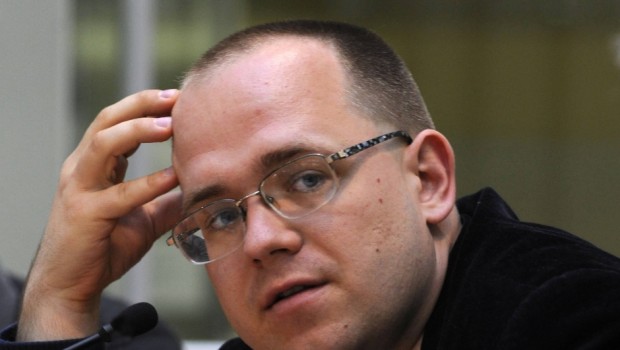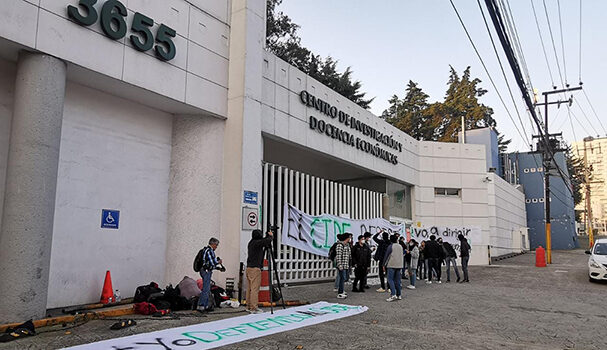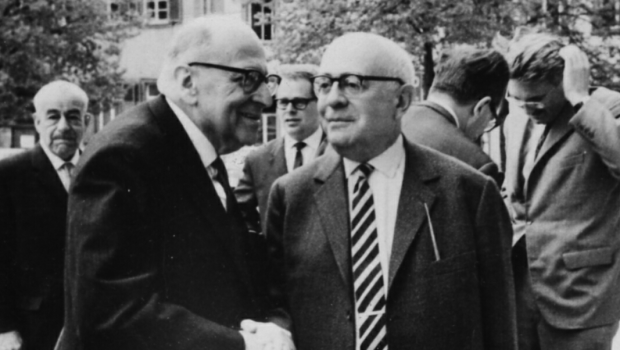Silicon Valley Solutionism
El “solucionismo”de Silicon Valley
Evgeny Morozov
I come from Belarus. This is where I grew up. I spent the first seventeen years of my life living there. I come also not from the capital, but from a very small city of miners. My entire family is in mining and spends a lot of time underground, and I was the one who managed to have escaped. So, with regards to authoritarianism, of course, Belarus is known for having one leader in place since 1995. The political situation there is not entirely enviable and if you listen to some of the pundits in America, they often describe it as the last outpost of tyranny in Europe.
I started working on technology very indirectly. I started working for a non-profit organization called Transitions Online, which was one of those western NGOs that was primarily interested in promoting freedom of expression, professional journalism but also, one might say, democracy and human rights in the former Soviet Union. And my contribution to their work was to figure out how to build their new media strategy. And of course, coming from Belarus, at the very beginning I was very excited about the potential of these new tools because the way I would put it is that everything else has been tried.
We have tried NGOs, we have tried political parties, we have tried building nationalist movements, everything in the case of Belarus has been tried and failed, and here comes this new technology: you can use text messages to mobilize people, you can use blogs to discuss things you cannot discuss in the traditional media, you can rely on the power of cell phones to capture police brutality. I mean, there was a lot of excitement around 2005 and 2006, which partly, again, derives from the political climate in Eastern Europe at the time. You had the revolution in Serbia, then you had a few years later the revolution in Ukraine, then you had the revolution before that in Georgia. Something was brewing in Eastern Europe, and we had a lot of hope, and I invested a lot of hope in technology.
And then, I think, my other cynical Eastern European part took over. I have to add that I also spent four years in Bulgaria. This is where I was educated. And Bulgaria is known, as the rest of the Balkans, for its cynicism. And my cynical Bulgarian side, I think, took over at some point in 2006 and 2007 and I became skeptical of the very tools and platforms we were using, in part because I saw that they were actually making very little difference to the situation on the ground, to the people who were on the ground using those tools. But I also noticed that certain governments themselves were actually actively deploying those tools to spy on the population, to engage in propaganda by paying and training bloggers to spread the kind of truth that the government wanted to spread by engaging in new forms of censorships or cyber attacks. I basically saw the other side of this digitalization. And I saw that if you leave things as they are, and we engage in this very happy, cheerful celebration of the power of the Internet, we would miss the real story, and the real story, unfortunately, was that certain governments were getting empowered as well.
On the one hand a utopian project, hoping that this might change the world for the better, and at the same time this dystopian cynical side, trying to show how well-meaning schemes all end up in disaster, somehow came together and produced my first book, which I think is entirely dependant on my professional experience as someone who worked for an NGO, but also as someone who saw many of those early intervention schemes on the ground, as someone who lived in Belarus and then in the Balkans.
So my next book is called To Save Everything, Click Here: The folly of technological solutionism,, and this book is in some sense a continuation of The Net Delusion in that I’m shifting my attention away from authoritarian countries, authoritarian governments, and I’m looking much closer at liberal democracies. I’m trying to understand what makes liberal democracies work and why they work as they do politically, socially. And my hunch when I was beginning to write that book was that there is a new player in town, and this player is Silicon Valley. Its geeks, engineers, technologists, innovators who, because our world became so mediated through technology, suddenly acquired power: they are the new elite, but they are an unacknowledged elite, in some sense.
And I also sensed when I began writing that book that they are very different from typical commercial players. They are not like Coca-Cola or McDonald’s, that just wants to go and to sell you another hamburger or another Coke, they actually want to change the world, and they want to change the world for the better. All the engineers have their own ideas about how to do that. And they have the means, they have the tools. And they are lucky in that we tend to view any initiative that involves technology and information as being beneficial, because somehow it reduces bias in society. As long as you have more information, things automatically get better, because you have more knowledge. Its a bias that goes all the way back to the Enlightenment, it is an old bias about technology, that technology is great for liberating us from nature and we should invest more power and energy into harnessing it to liberate ourselves from the burdens of the world, so in a sense we tend to be far less critical of them as players, because we already have existing biases about technology and information.
So what I discovered is that there is a sustained effort in Silicon Valley to make the world a better place, and this is more or less what I call “solutionism”. But to really understand its nature you have to see how they go about defining their problems. Part of my argument is that Silicon Valley is now empowered to solve problems that may not actually exist. They think that politics is bad because there is hypocrisy in politics, or politics is bad because there is partisanship in politics, so if only we can make everything open and transparent, if only we can make people more honest and replace political parties with direct democracy–which you can now do, because you can now vote on anything through our mobile phones, right, and we can read about anything through our mobile phones–democracy will automatically improve. That is one of the assumptions that geeks make. And one of the justifications for that assumption is not just how they think about democracy, it is also how they think about our unique historical situation. They think that because Wikipedia, and open source software, and Google, and Facebook have succeeded, we are on the edge of a new society, with entirely new rules, entirely new practices, entirely new institutions. So many of the schemes which would look outright kooky to us you know, ten or fifteen years ago, or twenty years ago, suddenly look normal because we are prepared for the next rupture.
We have seen that rupture in the world of education, in the world of knowledge production and we expect that that rupture will now happen elsewhere, be it politics, be it the world of fighting crime, be it the world of healthcare where now we can actually have consumers monitor their health and self-diagnose, instead of having them go to the doctor. I mean, this is wonderful for many people in Silicon Valley, because you destroy intermediaries, and because the idea is that intermediaries are bad. The flatter the world, the more easy it is for people to live in it. That is the template of Silicon Valley.
Traducido por David Medina Portillo
Provengo de Bielorrusia. Pasé los primeros diecisiete años de mi vida viviendo allí. Asimismo, no soy de la capital sino de una pequeña ciudad minera. Toda mi familia se dedica a la minería y fui el único que logró escapar de eso. Así que, respecto del autoritarismo, por supuesto, Bielorrusia es conocida por tener un líder gobernando desde 1995. La situación política no es envidiable y, si escuchamos a algunos de los expertos en Estados Unidos, a menudo la describen como el último bastión de la tiranía en Europa.
Empecé a trabajar sobre tecnología de manera muy indirecta, participando en una organización sin fines de lucro llamada Transitions Online, una de las ONG occidentales interesada en la promoción de la libertad de expresión, el periodismo profesional y, digámoslo así, en la democracia y los derechos humanos en la ex Unión Soviética. Mi contribución consistía en crear nuevas estrategias de comunicación. Y, obviamente, viniendo de Bielorrusia estaba entusiasmadísimo con el potencial de estas nuevas herramientas, muy distintas a todas las que se habían experimentado anteriormente.
Habíamos intentado con organizaciones no gubernamentales, partidos políticos o creando movimientos nacionalistas. En el caso de Bielorrusia se probó de todo y todo había fallado. Pero he aquí que surgía una nueva tecnología: mensajes de texto para movilizar a la gente, blogs para hablar de cosas imposibles en los medios de comunicación tradicionales. Podías confiar en el poder de los celulares para registrar la brutalidad policiaca. Entre 2005 y 2006 había mucho entusiasmo, determinado en parte por el clima político en la Europa del Este aquellos días. Tuvimos una revolución en Serbia y, pocos años más tarde, la revolución de Ucrania; antes había sucedido la de Georgia. Algo se preparaba en Europa del Este. Vivíamos una gran esperanza y puse muchas de mis expectativas en la tecnología.
Después, mi parte euro-oriental cínica emergió. Debo decir que viví cuatro años en Bulgaria. Ahí fui educado. Y como saben, Bulgaria es conocida –al igual que el resto de los Balcanes– por su cinismo. Mi lado búlgaro se manifestó y me volví escéptico sobre los instrumentos y plataformas que usábamos porque advertí que, en realidad, representaban muy poca diferencia en la situación, en la gente de a pie que utilizaba esos instrumentos. Noté también que ciertos gobiernos desplegaban activamente los mismos medios para espiar a la población, contratar publicidad y entrenar a bloggers que divulgaban la clase de verdad que el gobierno quería, comprometido con nuevas formas de censura y ataques cibernéticos. Fundamentalmente, vi el otro lado de esta digitalización. Advertí que, si dejamos las cosas tal y como están y nos entregamos a esta alegre celebración del potencial de internet, se omite la verdadera historia. Y la historia real es que, por desgracia, los gobiernos se han “empoderado” también.
Este proyecto utópico, la esperanza de que el mundo podía cambiar favorablemente y, al mismo tiempo, mi lado cínico y distópico tratando de mostrar cómo los esquemas bien intencionados acababan en desastre, coincidieron para escribir mi primer libro. Una obra determinada completamente por la experiencia profesional de alguien que trabajó para una ONG pero que, también, vio a muchas de aquellas tempranas intervenciones por el suelo. Alguien que vivió en Bielorrusia y, posteriormente, en los Balcanes.
Así que mi siguiente libro se llamó Save Everything, Click Here: The Folly of Technological Solutionism. Este volumen es, en algún sentido, la continuación de The Net Delusion, aunque llevando mi atención lejos de los países autoritarios y sus gobiernos para, en cambio, observar de cerca a las democracias liberales. Trato de entender qué hace que las democracias liberales funcionen y por qué trabajan como lo hacen políticamente, socialmente. Mi corazonada al empezar a escribir fue que hoy había un nuevo player en la ciudad: Silicon Valley. En un mundo tan intervenido por la tecnología, sus geeks e ingenieros, sus tecnólogos e innovadores, adquirieron poder muy pronto: son la nueva élite aunque, en algún sentido, una élite no reconocida.
Advertí también que son muy diferentes de los agentes comerciales típicos. No son como la Coca-Cola o McDonald’s, quienes sólo desean venderte otra hamburguesa u otra coke: quieren cambiar el mundo, realmente desean un mundo mejor. Todos estos ingenieros albergan ideas al respecto y cuentan con los medios y las herramientas para hacerlo. Asimismo, tienen la suerte de que todos nos inclinemos a considerar cualquier iniciativa tecnológica y de información como benéfica. Mientras usted posea más información las cosas mejorarán automáticamente: la información implica un mayor conocimiento. Sin embargo, se trata de un viejo prejuicio que nos reinstala en la Ilustración, bajo un supuesto según el cual la tecnología es nuestro gran liberador frente a la naturaleza. Deberíamos invertir más en ella para liberarnos así de las cargas del mundo. En consecuencia, tendemos a ser mucho menos críticos sobre aquellos players puesto que compartimos los prejuicios existentes sobre la tecnología y la información.
Hay un esfuerzo sostenido en Silicon Valley por hacer del mundo un mejor lugar mediante lo que he llamado “solucionismo”. Aunque para entender la naturaleza de este fenómeno hay que ver cómo enfrentan el conflicto. Parte de mi argumento es que Silicon Valley se ha “empoderado” intentando resolver problemas que quizá no existen actualmente. Piensan que la política es mala porque en ella se da la hipocresía o porque existe el partidismo. Así que suponen que sólo con hacer todo más abierto y transparente, volviendo a la gente más honesta y reemplazando a los partidos políticos por una democracia directa –que hoy podemos concretar votando desde nuestros celulares–, la democracia mejorará automáticamente. Este uno de los supuestos geeks más comunes.
Aparte de sus ideas sobre democracia, otro de los presupuestos para tal presunción es lo que piensan sobre nuestra situación histórica, a su juicio única. Creen que el éxito de Wikipedia, el software de código abierto, Google o Facebook, etc., nos ha puesto en el umbral de una nueva sociedad: reglas completamente nuevas con prácticas e instituciones también inéditas. Muchos de los esquemas excéntricos hace quince o veinte años, de pronto parecen normales. Estamos preparados para la próxima gran ruptura.
Hemos visto ya esa ruptura en el mundo de la educación, en la producción de conocimiento, y esperamos que lo mismo suceda en otros ámbitos, ya sea en la política, la lucha contra el crimen o en el terreno de la salud –donde los consumidores actuales podemos monitorear nuestro estado auto-diagnosticándonos en lugar de ir al médico. Esto es maravilloso para muchas personas de Silicon Valley porque liquida a todo intermediario bajo la idea de que cualquier intermediación es mala por definición. En cuanto más plano es el mundo más fácil para las personas vivir en él. Así es el patrón de Silicon Valley. [Traducción de D.M.P.]











Morozov is an amazing intellectual
May I simply say that I don´t agree with the author?
Loved it!